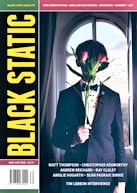 Black Static #74, March/April 2020
Black Static #74, March/April 2020
“Memories of the Occupation” by Matt Thompson
“Shattering” by Christopher Kenworthy
“The New You” by Ainslie Hogarth
“In the Wake of my Father” by Ray Cluley
“The Turn” by Seán Padraic Birnie
“White Cedar, White Birch” by Andrew Reichard
Reviewed by Kat Day
Issue 74 of Black Static has an appropriately—given current events—apocalyptic feel, starting and ending with stories that feature disease and contagion. The stories making up the filling of this dark sandwich center loosely around relationships, particularly familial relationships, and how they affect those that experience them.
In “Memories of the Occupation,” by Matt Thompson, we’re introduced to Victor, an assistant to Dr Krasz, who is dealing with the victims of some sort of strange disease—the dying man at the start of the story being but one of many. Later, Victor is sent to buy bread, and a stranger presses him to ask the doctor about the bodies of those who have fallen. This is a delightfully dark and murky story but, for me, Victor did not quite have enough agency, seeming to be little more than an observer of the bleak events that unfold.
“Shattering,” by Christopher Kenworthy, begins by telling us about a horse that’s hit by a coach, and which, despite apparently being split in half, continues to gallop down the road. Clearly, something very strange is going on here, and soon the focus resolves into that of our narrator—a young boy with a troubled home life who seems to have acquired a mysterious power. The imagery here is very strong, and the gruesome events are compelling. The main character makes some observations that leave us not at all certain whether he’s a reliable narrator. I confess that, at the end, I wasn’t entirely clear what exactly had happened, but, for me, the final sentence pulled the whole thing together and ended the story on a satisfying note.
“The New You,” by Ainslie Hogarth, features two sisters—Rita and Annie—who go to stay in a cottage with lots of mysterious doors. Whilst there they take a boat out onto the lake and witness something very strange, after which their lives are changed forever. The story then skips into the near future, where Annie is the mother of a teenaged daughter named Veronica and without giving too much away, we find ourselves beginning to wonder what happened to whom on that fateful day in the cottage. This isn’t an easy story, but it’s an interesting one that will leave you wondering.
“In the Wake of my Father,” by Ray Cluley, tells the story of a father and his son, Jake. It begins in the present, with Jake returning to his childhood home to spend time with his dying father, but the story soon jumps back to an incident that occurred when Jake was twelve years old, and then gradually makes its way back to the present day. There’s a strange sort of tenderness here, as Jake’s reminiscences of his time with his father, and afterwards, help him to make his peace with what’s happening in the present. It’s a story that conjures the gentle, everyday horror of mortality and inner demons, and it’s rather beautifully done.
In “The Turn,” by Seán Padraic Birnie, Marie is driving drunk on a narrow country lane when her car runs out of fuel. Fortunately, a stranger appears and offers her assistance. Or does she? Once again, it’s not quite clear whether we can trust our narrator’s version of events. This is an odd piece, made even odder by the lack of quotation marks to mark speech. In addition, and picky though this may seem, the interchanging use of “petrol” and “diesel” bothered me enormously—no one who drives a petrol (i.e. gasoline) vehicle would knowingly put diesel into their fuel tank, even if they had drunk a few too many glasses of wine (this is a British publication, and the story is set in Britain, where both petrol and diesel cars are common). Perhaps this was a deliberate nod to Marie’s confused state, but it jarred with me, and I found myself unable to see what Marie was supposed to have learned from the whole experience.
“White Cedar, White Birch” by Andrew Reichard, is set on a remote island, deliberately isolated from the rest of the world after an apocalyptic event. Zack, the main character, is one of just 512 people on the island, and quickly becomes a farmer. I don’t think it’s any kind of spoiler—particularly given the accompanying artwork—to say that this is a zombie outbreak story, although the term is very consciously avoided throughout. However, unlike most such stories, the focus isn’t on escape but rather on trying to make the world, or at least a corner of it, continue to function as a society. This felt like a fresh approach, and one I appreciated, until the ending which, disappointingly, appeared to revert to type.
Kat Day is an associate editor at pseudopod.org, writes a mixture of stuff and can be found generally hanging around on social media. You can follow her on Twitter @chronicleflask.